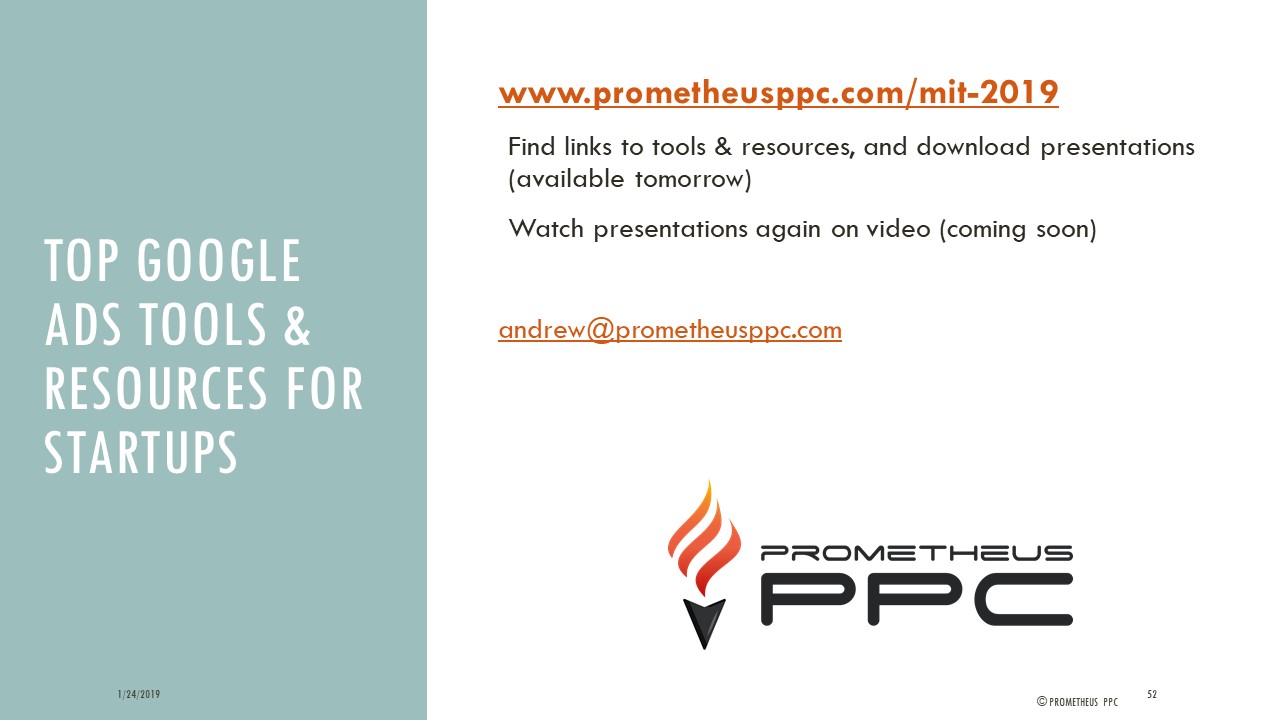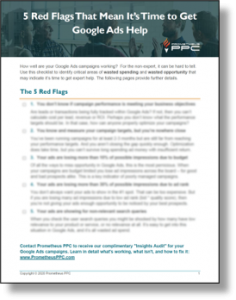Google Ads Q&A with Startup Founders

MIT Presentation (part 8 of 8): Google Ads Questions from Startup Founders
Read or watch the Q&A between MIT’s startup founders and Google Ads expert and founder of Prometheus PPC, Andrew Percey. Questions address B2B vs. B2C, ideal ad spend levels, ideal test durations, when Google Ads will NOT work for your business, and more.
This presentation was delivered by Prometheus PPC founder, Andrew Percey, on MIT campus in Cambridge, MA, on January 24, 2019, as part of “The Startup Code 2019” marketing seminar, which he organizes and co-hosts with serial entrepreneur Kenny Goodman. The attendees were MIT alumni, faculty, grad students and other members of the MIT community.
While this presentation includes specific advice for startups, the advanced strategies & tactics described can be used by any business that is looking to refine or troubleshoot their business model and marketing plan.
Video (part 8 of 8)
PDF slides (part 8 of 8)
No slides for this Q&A portion of the presentation.
Links to all posts in this presentation series, including videos, slides & transcripts:
- Full Presentation: 5 Ways to Test & Optimize your Business Model with Google Ads
- Introduction: What is Google Ads and Why Use It?
- How to test & optimize your prospect targeting, messaging and sales flow:
- Method #1: Learn Your Available Prospect Volume with Google Ads
- Method #2: Learn What Your Google Ads Prospects Actually Search For
- Method #3: Learn Which Marketing Messages Engage Your Google Ads Prospects
- Method #4: Learn Which Business Offers Resonate with Your Google Ads Prospects
- Method #5: Learn How to Stand Out from Competitors in Google Ads
- Conclusion: Best Google Ads First Steps Plus Tools & Resources
- Q&A: Google Ads Questions from Startup Founders
See all “Startup Code 2019” presentations and resources
See all MIT marketing seminars
Transcript of Presentation (part 8 of 8)
Q&A
[audience question: “How should I approach it on a B2B level for enterprise, because it appears like it’s driven towards B2C?”]
So certainly Google Ads does both. One big visual difference is if you remember those shopping ads I showed earlier with the image and the price, that’s only for products, and that’s usually B2C. Not always, but usually. But actually, most of my clients are B2B clients. They are looking to sell high value services. That’s what I do as well with my own advertising. So that also can be done, just in a slightly different way. But it’s very much the same set of tools and resources.
I will say that, typically, you’re going to spend more in a B2B space, if it’s at all competitive. As one example, for my agency advertising, my average cost for a single click is about $45. Whereas, if you’re selling a consumer product, it might just be $2 or $3. Or if you’re in the legal space, heaven forbid, and you’re going after asbestos cases, you know, a couple hundred dollars for a single ad click. So it can range tremendously. But the potential is there. It works for all those cases. And I can show you lots of examples and case studies of markets where it does work. Ads that are working there just have a little bit of a different use of the way you’re doing them with the tools, the options available, but it works great.
[audience question: “Is there a price point that is just too much?”]
Absolutely there is. So it’s going to be different for every company. Obviously, you have to figure out the click cost. And then of the people who click and come to your site, what percentage then buy something. Then figure out how that compares to the return on investment you’re going for. And I will say it’s often difficult for product companies to make search ads, regular text ads profitable, because those are more expensive, and they eat very quickly into your product margin. If you’re selling a $20 product, text ads are probably not going to help. It’s very hard to make that work from an ROI point of view. Whereas the shopping ads can be fantastic for that.
And then for services, again, I encourage you to think about not just how much this particular sale is worth, but the lifetime value of that client coming in. It could be worth spending $1,000 for one conversion, just to get a client who’s going to be with you for the next 10 years and spend $10,000 on you, or $100,000 on you. You know, it can get scary thinking about it. And it’s often difficult if you haven’t done this kind of advertising before to think, well, gosh, $50 for an ad click, what if just my competitors come on and click ads? I mean, am I wasting all this money? But do the math, and for your business, it could make fantastic sense. Lawyers don’t spend $200 per ad click because they’re losing money, right? It works out for them in the long term.
[audience question: “How do you discern potential markets and compare them with actual market?”]
Well, I wish I had that kind of crystal ball. I will say that if you do this sort of research and find the market size is small, you then need to ask another question – is some other force right now making it bigger? Is someone else starting to promote or talk about this space in a way that it can reasonably become big enough, in the next, you know, whatever your timeframe is, to make it work for your business? And if the answer is no, that means you’re going to have to do it. And if you don’t have the money to do it, then you’re in a tough spot.
[audience question: “If your product isn’t even built yet, what is the benefit of using [Google Ads] to test the landing page?”]
So I would kind of flip that around. I hope before you spend the time and resources to build the product, that you’ve done some testing like this. You know, often we get the idea of a great product or service from our own experience. But that can be very different from the experience of consumers out there or businesses out there. And you might end up being extremely surprised if you invest the time, especially for a complicated project, a year and a half, two years, to get a project out there, and only then find out there aren’t very many people looking for this.
I would advocate doing this sort of research as soon as you start to formulate an idea, because it’s going to help shape your product development. It can help shape the benefits you choose, the features you choose, and it may even help you scrap the idea before you spend a lot of time and money on it.
[audience question: Have you ever had an experience of someone coming to you and using Google Ads to test, but then actually saying, I’m going to spend my actual money going forwards on LinkedIn advertising, for example?”]
I have had those cases, I’ve had clients come in who have never done Google advertising before, and I started to work with them. And we learned, within a few months usually, that it’s just not working for them. This is one reason I prefer working with established businesses who have already done Google advertising, because they have a proven model that I know I can help with. But in those cases, what they usually go to, I haven’t seen them go to LinkedIn yet. I’m sure Mark can speak more to that, he’ll be up next talking about LinkedIn.
I do see people go to Facebook, and that tends to be more for, I would say, smaller product companies, where a cost per click on Google Ads doesn’t work. But the much lower cost per click on Facebook, together with the enhanced demographic and interest targeting on Facebook can make it work.
[audience question: “So typically, how long does it take for a startup to get results from Google Ads, to give them enough feedback to move forward?”]
I typically give the guideline for almost any business, that if you set up these campaigns well, and test for about three months, you’re going to get a very good sense of what your long term potential is, how much it will cost to bring in a new client or a new buyer, and how much traffic there is. Three months, you know, with monthly iterations, with sufficient volume is usually good enough for that. For a startup,
I would just advocate really early on focusing on the testing part. You’re not so much, you’re not going to want to blanket the whole United States necessarily, and try and drive leads yet. You just want to test your ideas. And that can also be done very quickly and more cheaply and can be done continuously as you go through the product process.
[audience question: “After the three months of testing, do you need to carry on, or can you stop at that point?”]
In all honesty, you do need to carry on because everything keeps changing. The market may change for one thing, Google will absolutely keep changing, they roll out dozens of new features every year, change the way the interface works, to give additional reach if you learn about these new features. And most importantly, your competitors are going to change. They’re probably not going to sit still. Unless you’re all in the room and you agree, “Let’s just sit on this guys and see what happens,” they’re going to keep trying to improve and do better than you. So what you do see, if an account just sits still, is a general gradual decline usually, over time.
[audience question: “When you’re looking at a keywords, how many searches is a level that is acceptable to say let’s try this, let’s try out this keyword?”]
Right. I gave one example before saying if there are 100,000 searches for a product, and you have a typical 5% click through rate, and a typical 2% conversion rate, that gets you to about 100 sales a month. So if that’s your business model, that’s what you need. If you’re looking for 100,000 sales a month, you’re going to really have to kick up the volume much beyond that.
But to give a very different example, if you’re in the services business, in my business, for example, I’m happy to get just a few good leads per month. And so if I get maybe 100 impressions, and maybe 5% click through and then a couple converts, you know, that’s a very good rate for me. So much lower volume keywords can work as well. It goes back to your economics and what you’re trying to achieve each month for your business.
And also, just one last thing to keep in mind too, for products, the conversion rate is usually much lower. If you’re in the service business, and you’re focusing your ads well, you can get 20% or 30% conversion rates or better. For products, it’s usually in the 2% to 3% range, so you need that much more volume for products to work in Google ads.
[Host] Great. Round of applause for Andrew please!

